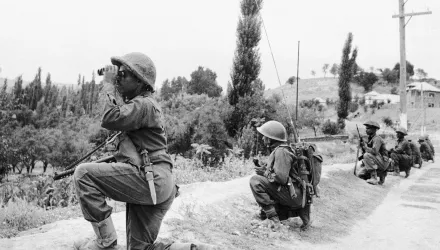BEIRUT -- Arabs and foreigners alike constantly discuss why the Arab region reflects such a combination of positive and negative factors. On the positive side, Arab cultures are warm and welcoming, families and communities tend to be close-knit and supportive, and the process of state-building in the past 75 years has improved the life expectancy and wellbeing of the vast majority of Arabs, especially in terms of providing basic services. On the negative side, the entire Arab world is politically non-democratic, riddled with small and large conflicts, increasingly scarred by ethnic and sectarian tensions, with economically chronic dependence on oil and gas revenues and their spin-offs, and burdened by the constant inflow of foreign armies and political meddling.
The problems and stresses of our region seem to have slightly overtaken its assets and strengths in recent years, which is why political violence, terrorism, wars, criminality and sectarian tensions have increased in recent decades. This includes a paradox of sorts: The entire Arab world, at the country level, has been remarkably stable in terms of the continuity of ruling elites and regimes since the last wave of coups around 1970.
Is there a link between the perpetual incumbency, regime stability with the widespread tensions and conflicts that define the Arab world -- a single underlying phenomenon that explains why we are as we are? I see one common thread that permeates our entire region: the nature and conduct of the strong, durable but problematic modern Arab state -- the "state" being both the physical make-up of the country and the ruling elite that dominates and operates its power structure, mainly the government bureaucracy and budget and the state‘s many military and police branches.
The "modern Arab state" I speak of spans the 22 member states of the Arab League, reflecting a wide range of very different cultures and governance systems. But some similarities can be clearly seen across the region: The states and their ruling elites and regimes have been durable because in their early decades they focused heavily on meeting human development needs (schools, hospitals, telephone, roads, homes, jobs) in relatively successful state-building exercises, and in the past four decades they have focused on security that maintains the existing power configuration in place. Not a single Arab country can say with any certainty that the configuration of the state, the policies and values of the government, or the perpetuation of the incumbent ruling elite have been validated by the citizenry through any kind of credible, transparent and accountable political process.
The Arab state has been transformed into a security system, and the Arab citizen has been downgraded into a mere consumer. Just about the only thing that every Arab individual is allowed and encouraged to do without having to get written permission from a security department is to go shopping. Virtually every other aspect of life is controlled through sophisticated and pervasive control mechanisms, with just a few pockets of human vitality in one or two urban quarters holding out against the authoritarian demands of the modern security state.
The achievements of Arab society and state in the period from around 1920 to 1970 included impressive state building and some vibrant cultural and social expressions, but since the early 70s the imperative of state dominance over individual liberty and cultural effervescence has seen our region transform into a truly spectacular array of state types. So looking around the region, we find Arab states that can be described as authoritarian, weak, strong, or fragile states. We also have broken states (Somalia), states that disappeared and/or returned (Kuwait, South Yemen), security-dominated states (Tunisia, Syria, formerly Baathist Iraq), erratic states (Libya), pirate states (Somalia), vulnerable states (Lebanon, Palestine), privatized states in the hands of small ruling elites (most Arab states), family states that carry a family's name (Saudi Arabia, Jordan), tribal states (Yemen, Oman), mini-states (Kuwait, Qatar, Bahrain), occupied states (Palestine, Iraq to an extent), and various degrees of client and proxy states, rogue states, gangster states, and others that defy description.
The inability of most states outside the oil producers to provide for their people's material needs, and the broad weakness of political, democratic and human rights in all Arab states, has seen a wide range of non-state actors emerge in society to offer citizens security, services, identity and representation, including religious, tribal, nationalist, corporate, civil society, and other kinds of groups. The central state now often negotiates relationships with these forces in society, rather than only providing the overarching system of order and identity within which multiple actors engage one another and the outside world.
The heavy-handed, largely unaccountable power of the state that penetrates every aspect of life has sparked various reactions, many of which see local and foreign groups challenge, resist or fight the state power. The promises of its early years of independence have frayed, and the Arab world is left today with a peculiar array of states that are at once durable and vulnerable.
Rami G. Khouri is Editor-at-large of The Daily Star, and Director of the Issam Fares Institute for Public Policy and International Affairs at the American University of Beirut, in Beirut, Lebanon.
Khouri, Rami. “Durable and Vulnerable: The Modern Arab State.” Agence Global, May 17, 2010




